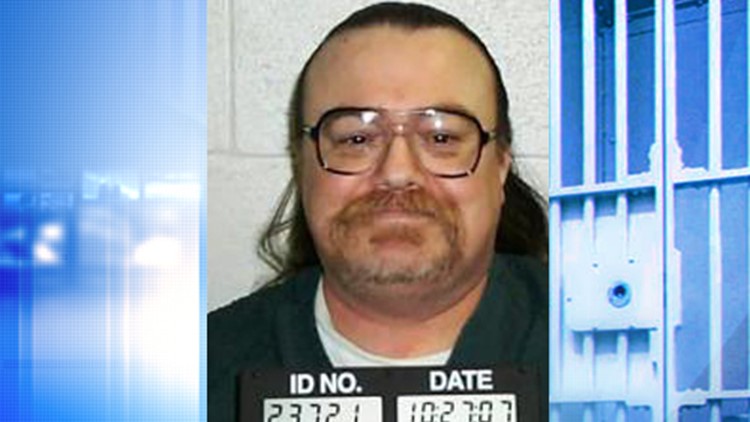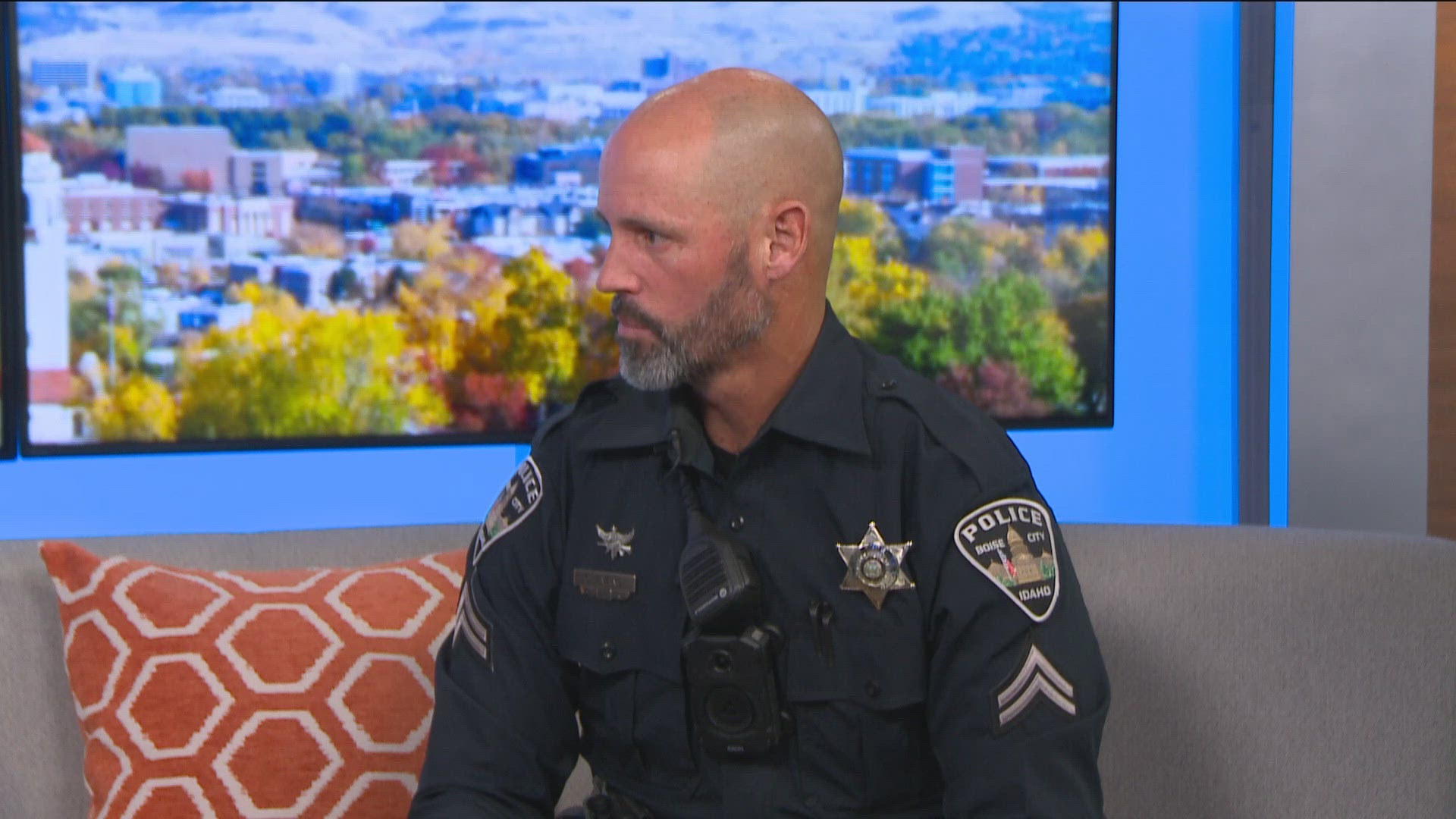BOISE, Idaho — Decades after a woman and her nephew were murdered in a robbery at a remote cabin near McCall, lawyers are urging the Idaho Commission of Pardons and Parole to spare the life of the man responsible.
One of eight people on Idaho's death row, Gerald Ross Pizzuto Jr.'s guilt is not in question: He is undoubtedly the person who killed 58-year-old Berta Herndon and her 37-year-old nephew Del Herndon in 1985, "an immeasurable loss" that continues to wound the victims' families, attorney Bruce Livingston said
The inmate's defense team urged board members Tuesday to consider Pizzuto's poor health, his repeated brain injuries, and the torturous childhood physical and sexual abuse he suffered at the hands of his stepfather as they weigh whether the state of Idaho should end Pizzuto's life.
Prosecutors, however, argued that he was a repeat violent criminal who never showed any remorse about the lives he destroyed and does not deserve mercy now.
The clemency team is not asking for Pizzuto's release; instead, they urged board members to vote to recommend to Idaho Gov. Brad Little that Pizzuto's death sentence be changed to life without parole, enabling him to die inside prison walls of natural causes rather than lethal injection.
Livingston reported that Pizzuto is confined to a wheelchair and is dying of advanced bladder cancer. He was placed on hospice care in 2019, with doctors estimating then he had about a year left to live. Pizzuto has also had multiple heart attacks and is dealing with complications of diabetes severe enough that he is at risk of losing his feet or legs, the attorney said.
"In his infirmity, he is no threat to anyone," Livingston said. "We ask you today to take pity on Jerry, commute his sentence, and leave him to die in prison from his deteriorating health."
The clemency hearing included graphic accounts from two of Pizzuto's sisters, who testified that as a child their brother was repeatedly raped, beaten unconscious with boards, a horsewhip, and other objects, and psychologically abused by being forced to sleep outside and eat from a pig trough in the basement.
"Jerry never had a chance in any way. He wasn't able," one of Pizzuto's sisters said. "And if there was ever a glimmer, there was never a glimmer, because it was extinguished. It is torturous to live like that."
Incessant, inescapable violence like the kind inflicted on Pizzuto can "remove the brakes of impulse control" and create developmental delays that linger long into adulthood, public defender Deborah Czuba said.
Czuba said Pizzuto was well behind his peers in school and considered "slow" as a child, while tests since his incarceration showed problems with memory and deductive reasoning, difficulty recognizing and adapting to changes in circumstance, and trouble following instructions with more than two steps.
"In the end, child abuse has a deadly impact," she said. "It's profoundly damaging to the brain."
He also suffered from at least three severe brain injuries - a fall down the stairs at age 3, a knock-out blow from his stepfather at age 8, and a bicycle crash at age 14 - that further stunted his abilities, Czuba said.
Although the U.S. Supreme Court ruled in 2002 that it was unjust to execute people with intellectual disabilities, those with conditions considered "borderline intellectual functioning" like Pizzuto remain in a legal gray area, Czuba said.
In 2012, a court ruled that Pizzuto - whose scores in IQ tests ranged from 60 to 92 - did not meet the requirements of mental disability that would necessitate sparing his life, a ruling Czuba said did not take the full scope of his limitations into account.
"Jerry has a significant impairment," she said. "All in all, whatever number is put on Jerry, whatever label he is assigned, it is clear that Jerry is impaired in his intellectual function."
Lamont Anderson from the Idaho Attorney General's Office argued that a "miserable childhood" did not absolve Pizzuto of responsibility for what he had done.
"How does that excuse Pizzuto's complete lack of acceptance of responsibility or any showing of remorse from the time he committed murder through today?" he asked. "How can he be shown mercy when there simply is no remorse? What mercy was shown to the kidnapping and murder victims?"
According to court records, Pizzuto was camping near Ruby Meadows in Idaho County with two other men when he came across the Herndons, who were prospecting in the area. Pizzuto entered their cabin, tied the pair up and beat them with a hammer, before stealing their belongings and bragging that he had “put those people to sleep, permanently.”
James Rice, one of Pizzuto's companions who was not present during the attack, then shot a still-alive but mortally injured Del Herndon in the head.
The double murder of the Herndons was not Pizzuto's first brush with violent crime, the attorney said.
Pizzuto's ex-wife testified in previous court hearings that he was brutally abusive to her during the marriage, knocking out her teeth, drowning her dog, and once attacking her so savagely while she was pregnant that she went into labor with a preterm baby, who did not survive.
In May 1975, Pizzuto kidnapped and raped a woman at gunpoint in Michigan. He was convicted of the sexual assault and ultimately served nine years in prison, Anderson said, but absconded from parole after he was released and made his way to Seattle.
There, he strangled to death 51-year-old Rita Drury, a woman he knew, in her home in March 1985, then shot 31-year-old John Jones to death weeks later. Before police could close in on him, he made his way to Idaho, where he encountered, robbed, and killed the Herndons in July.
Just days after the double murder, Pizzuto pulled a gun on another man he had met at Gold Fork Hot Springs, robbed him, and left him tied to a tree.
Anderson said Pizzuto "has received more due process than any other death-sentence murderer in Idaho," with his case being taken up multiple times before the Idaho Supreme Court and 9th Circuit Court.
Reject the clemency appeal, he urged board members, and let Gerald Pizzuto die the way he deserves.
"Keep in mind that Rita, John, Del, and Berta were not permitted to die naturally," he said. "Their lives were terminated by a vicious murderer, an evil and vile man with no conscience."
Judy Gonzalski, Berta's daughter, described her as a devoted mother and grandmother who was always ready to lend a listening ear.
After decades of watching the case drag on, she said, it's appalling that a commutation was even being considered.
"It's just so hard to believe that I have outlived her. It's just unacceptable to me," Gonzalski said. "Now I'm 64, and justice has not been carried out."
In an at-times rambling statement to the board, Pizzuto alternately said that he did not commit the murders, that he deeply regretted them, and that he did not expect the victims' forgiveness for what he had done.
"I don't want to sound like I am kissing ass, because I'm not. I would let them know, off the top, I'm so damn sorry," he said. "This shouldn't have happened. It's a bad dream that won't quit."
Pizzuto told board members that he had gotten baptized behind bars and tried to keep himself out of trouble. He has watched himself turn into an old man in the last 36 years, he said, and is not the same person who entered prison decades ago.
"I'm dying from cancer. I look at this and I see, OK, I'm being punished," he said. "The Lord gave me a very slow death."
Executing him now, at the advanced state of his disease, would be a waste of money, Pizzuto argued, asking the board to commute his death sentence and give him a chance to prove himself.
But the deputy attorney general argued he had already had enough chances.
"What has Gerald Pizzuto done to deserve mercy?" Anderson asked. "Absolutely nothing."
The board adjourned for the evening without making a decision, then returned and went straight into executive session Wednesday morning. The parole board's clemency decision has not yet been announced.
Watch more crime news:
See the latest Treasure Valley crime news in our YouTube playlist:



